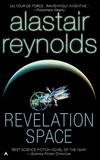
Nice bit of science fiction to kick off the new year.
Where Revelation Space really shines is showing a future that humanity might just see if we take several of the trends in current technology and thoughts that futurists hold about how the world might entail and dial them up even further.
We don’t have a way to go faster than that the speed of light… But that’s okay, since we’ve figured out a combination of long periods asleep and genetic/cybornetic alterations so that spacefarers don’t seem to mind. This leads to some interesting thoughts on how two worlds might only get snippets of history between one another and then only when the few relativistic starships pass through, with crews that may not even count as human any more. The AIs are especially interesting, even if they’re only tangential to the story, bringing up the problems that having a person-turned-copyable-computer- program might just cause.
There’s also an interesting (spoiler laden) solution to the Fermi Paradox in there, although it took a while for everything to come together. Of everything that most makes me want to read the sequels to see if Reynolds builds on that any.
The plot was decent enough, although there were a few ‘gotcha’ moments towards the end that I wasn’t entirely sure the story deserved. I like a mystery as much as the next person, but I like it best when the reader has a chance ahead of time to figure out what is going on.
The characters didn’t feel entirely complete at times–although some of that might come from the unhuman nature of a good number of them.
All together, I liked it. It took far longer to read than most books I’ve read over the past year, but I think a large part of that wasn’t due to the book. We’ll give the sequel a try and see if it goes a bit quicker.